How to soundproof a bedroom for a peaceful night's sleep
Finding out how to soundproof a bedroom is a brilliant idea for anyone plagued by unwanted noise, either from an outside source, or from other areas within the house. We asked the experts for advice on the best methods
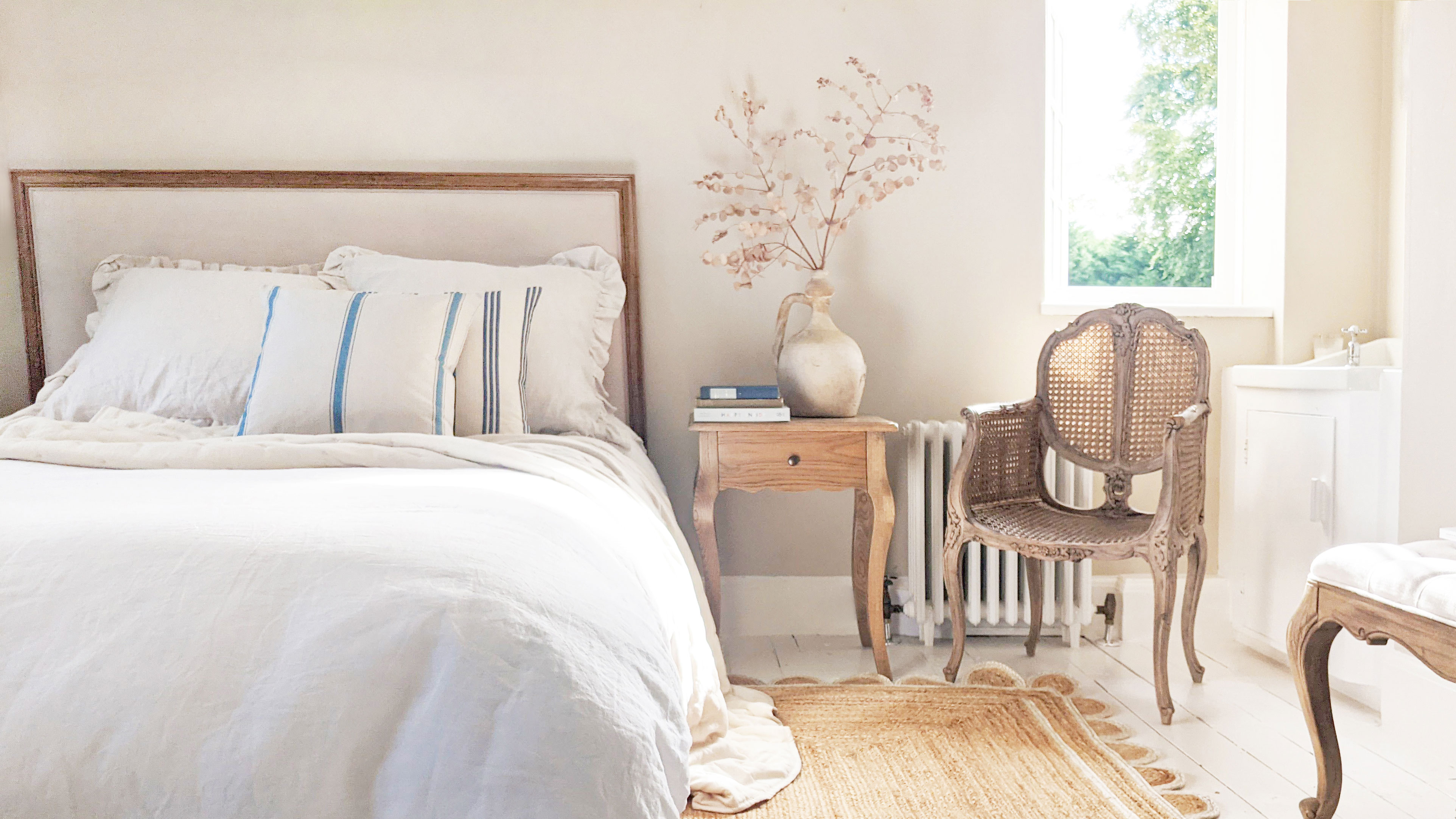
Whether you are wondering how to soundproof a bedroom due to being disturbed by noisy neighbours, your teenager's blaring music or busy traffic rumbling past your windows, keeping unwanted noise out of the space where you go to sleep should be a priority.
Good bedroom soundproofing is often not given as much thought as it should when it comes to bedroom design, yet the effect it can have on the way you feel about your home and how it works for you on a day-to-day basis can be transformative.
We asked the experts for their opinions on the best ways to soundproof a bedroom, looking at solutions for different types of walls, as well as windows and doors, to help you keep out noises that disturb you the most. We've also included a few easy-to-implement ways of improving the soundproofing qualities of your space.
What are the best ways to soundproof a bedroom?
Just as when soundproofing a ceiling, there are lots of different ways to approach soundproofing a bedroom and what works for one homeowner won't necessarily work for another.
"There is no one-size-fits-all solution for soundproofing a bedroom," says Jim Springham, sales manager at Soundstop.co.uk. "We have to spend time with customers going through the nature of the problem, understanding the structure of their house, the space they have available and their budget."
"Soundproofing can be quite complex, so one of the key messages is really to speak to an expert," agrees Phil Lyons, technical sales manager at The Soundproofing Store. "The systems we supply can all be fitted by a competent DIYer, but it’s important to choose the correct solution for the unwanted noise being heard, the construction of the property and the amount of space they can lose from their party wall. We always encourage customers to talk to us, so we can discuss their situation in more detail and advise accordingly."
Here, we have taken a look at the most common solutions to help you decide which might be best for your own needs.

Jim Springham is sales manager at Soundstop.co.uk. The small team is passionate about helping customers improve their soundproofing measures and understand the stress and discomfort that a noisy neighbour, or a sound-sensitive next door resident can cause.
What kind of noise is bothering you?
Before coming up with any soundproofing and noise control measures, it is important to establish the type of noise that is causing you problems.
"There are airborne sounds, such as music or voices, and impact sounds, like someone stomping around," explains Jim Springham. Sometimes the problem can involve both types of noise.
There are other considerations too.
"How loud is the noise coming through the bedroom wall? Is it shouting and loud music, or quieter conversation? The answer to this will determine the right wall sound insulation system for your bedroom wall," explains Phil Lyons.
The way in which an individual reacts to noise will also play a part in choosing the right system.
"How susceptible to noise are you? If you naturally have a high sensitivity to noise, then a higher performing bedroom wall soundproofing solution will be required," says Phil.

Phil Lyons heads up the technical team within The Soundproofing Store, bringing with him a wealth of expertise in the field of soundproofing and acoustics. With considerable experience in addressing a variety of noise-related challenges, Phil plays a crucial role in assisting customers in finding effective solutions to all types of unwanted noise problems.
Phil also serves as the head of the studio department, specialising in soundproofing music rooms and band practice spaces. His proficiency extends to regularly collaborating with builders and specifiers on projects that require compliance with Part E Building Regulations. Phil regularly demonstrates his versatility and extensive knowledge of soundproofing across all situations.
An authoritative voice within Soundproofing, Phil also fronts The Soundproofing Store YouTube channel, sharing his extensive knowledge and expertise with people all over the world.
Soundproofing a solid bedroom wall
The way internal walls, stud or solid, are soundproofed will be different so you first need to determine what kind of wall you are dealing with.
In many cases, noise from outside your own home, such as traffic, voices from the street and your neighbour's daily activities will be coming in through a solid wall.
"If it is a party wall it is helpful to know what it is made out of," explains Jim Springham. "This can affect your choice of materials to resolve your noise problems. This isn’t as hard as it sounds. Normally buildings built before the war are made of brick. After 1950 they become a bit harder to assess. The thing you want to be on your guard against is breeze block. If the wall has plasterboard stuck to it with dot and dab this might need removing. In general plastered brick walls are the easiest to soundproof."
"First, check the wall for weak points, such as gaps as this will be a weak point for sound to escape through," says Phil Lyons. "Treat the walls like waterproofing, it will only be as good as the weakest point.
"You can improve the wall's ability to block airborne noise by adding mass/weight to the existing wall. By adding weight and density, you are making it harder for airborne sounds to travel through the bedroom wall," continues Phil. "To improve the wall's ability to absorb the vibration energy (impact noise) you want to add resilience to the bedroom wall."
The right option for you will not only be based on the type of sound bothering you, but also by how much you are willing to spend as well as the size of your room.
If you have a little more space to play with, then one of the best options is to build a secondary wall, using a sound reduction system between the old and new sections.
"The ReductoClip Independent Wall System is extremely effective against loud or excessive noises and will address both airborne and impact noises," advises Phil Lyons. "It is designed to completely isolate the bedroom wall by firstly building a stud frame, (a minimum of 10mm away from the party wall). You then attach the ReductoClips and Reducto Furring Bars to the new stud frame. This decouples the addition of high mass wall layers from the original bedroom wall, greatly reducing the transference of sound vibration energy from the adjoining room into the bedroom and vice versa. The addition of high mass wall layers also block airborne noise."
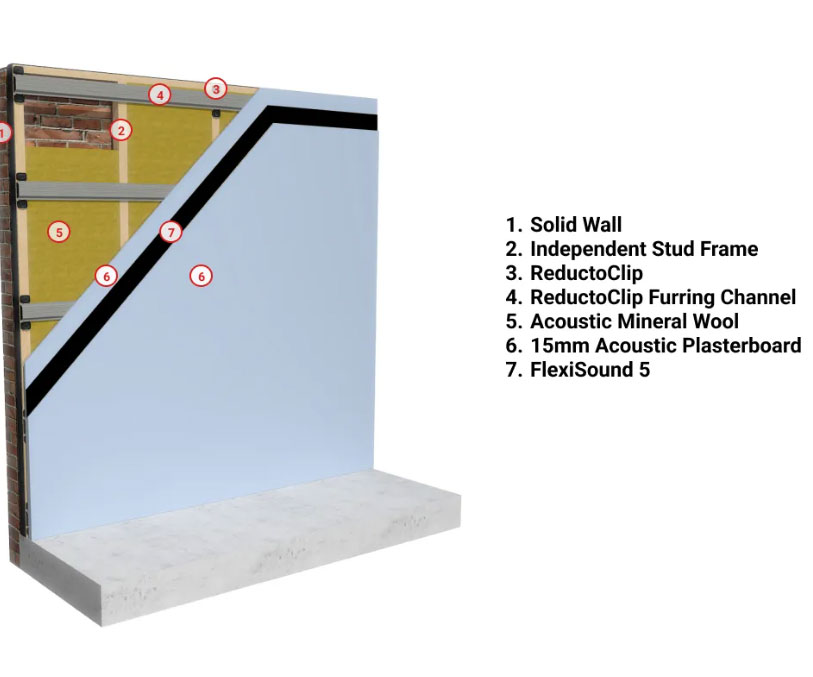
Soundproofing a small bedroom
Using a system that requires building a new wall or a stud framework is not always going to work - particularly if you are working on small bedroom ideas. Even with The Soundproofing Store's ReductoClip Independent Wall Solution being the thinnest on the market, it still results in a 120mm wall build up - so what are the alternatives for those with smaller bedrooms?
"In this case, directly applied materials can be a better option," says Jim Springham. "These solutions are usually made up of a dense rubber, shock absorbent material, finished with an acoustic plasterboard that can then be skimmed and painted or wallpapered as normal.
"A good rule of thumb is that the more space you can lose the better the acoustic performance, especially when it comes to the bass frequencies (such as deep men’s voices). Don’t panic, you can still get a good result with slim line solutions," continues Jim. "Slimmer line solutions tend to use specialist materials which cost a bit more."
Something like the Easy Fit Slim Line Stick-on Panels from Soundstop.co.uk would be a great choice - the rubber panels and plasterboard finish result in just a 45mm depth gain yet can give you between 65%-70% reduction in noise. Even better, it is a DIY-able stick-on solution with little in the way of mess or disruption.
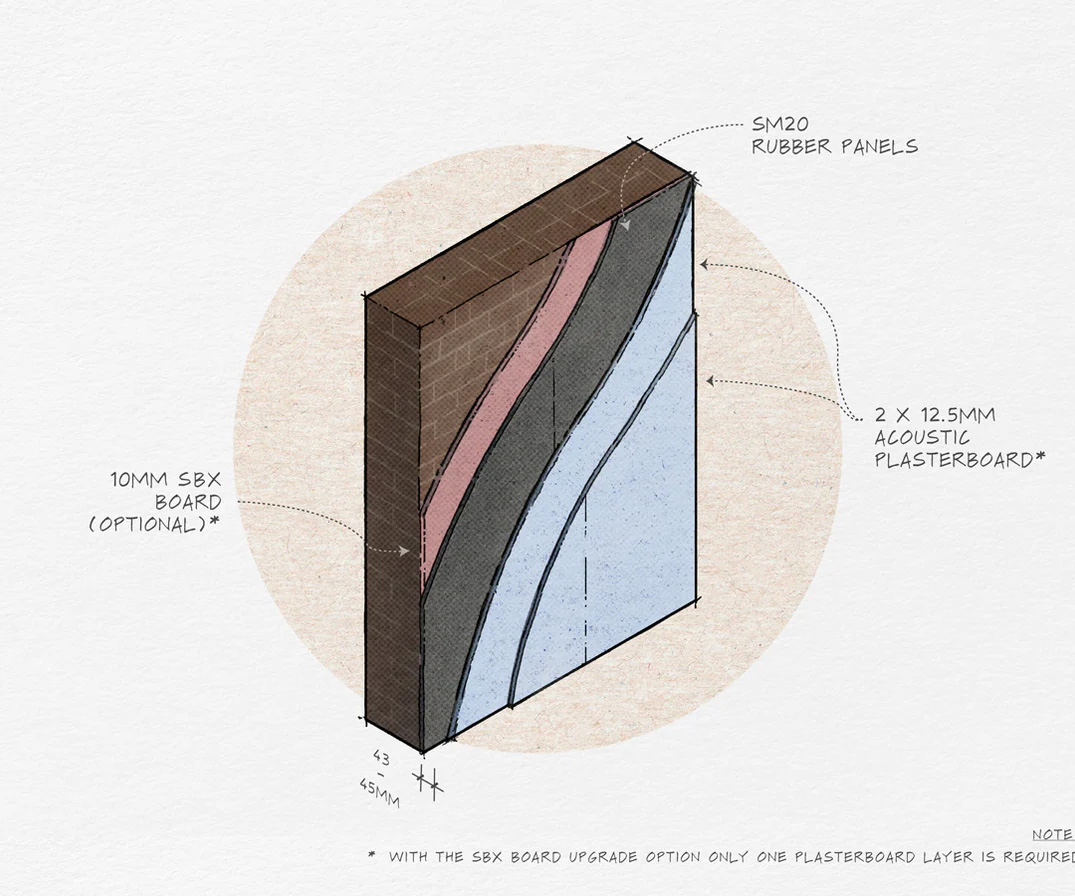
How do you soundproof a stud wall?
Soundproofing a stud wall requires a different type of solution to solid walls, such as adding in acoustic insulation.
"There are instances when the bedroom wall needing to be soundproofed is to stop noise transferring between internal bedroom walls within the same property, rather than the neighbouring property," explains Phil Lyons. "In this instance, the internal wall will be a stud wall. The same principles apply as for a solid party wall, however the recommendation when soundproofing a stud wall within a bedroom, would be to also add 50mm acoustic mineral wool between the stud frame.
"Using a combination of high mass materials will always perform better than using more of the same material," points out Phil. "Dampening or decoupling the stud wall will improve the ability of the stud wall to absorb the unwanted sound energy and vibrations while adding acoustic mineral wool between the stud frame absorbs any sound from getting inside and stops the sound from resonating and amplifying within the void."
What are acoustic panels?
You may well have heard the term 'acoustic panel' when looking into soundproofing methods, but it is important to be clear on what these are.
"There is often some confusion when the term ‘acoustic panels’ is used in relation to soundproofing. Soundproofing wall panels and acoustic wall panels are completely different products and can't be interchangeably used," explains Phil Lyons.
"If you are trying to block noise from getting into or out of a room, then you need to look at soundproofing the wall with soundproof wall panels such as the the SoundBoard 4 Direct to Wall soundproofing panel. This could be trying to block the unwanted noise from noisy neighbours through your bedroom wall from TV noise, music, talking, snoring etc.
"However, if you are looking to improve the room's acoustics within a space (by reducing the echo and reverberation) then you would need to look at sound absorption and acoustic wall panels," continues Phil. "This is a common problem in communal spaces such as classrooms, offices, village halls, schools, restaurants. Acoustic panels are also used to reduce echo and reverberation in music studios and when creating a home cinema."
These Decorative & Sound Absorbing Acoustic Panels from Amazon are a stylish option.
How do you soundproof a bedroom window?
In some cases, unwanted noise from outside can be coming in through the windows rather than the walls.
"Windows and doors will always be a weak point with regards to sound, as they have far less mass than the walls," explains Phil Lyons. "The best way to fix this would be to upgrade windows and the frames surrounding them. Consider replacing the window with better performing double or even triple glazed windows. The addition of acoustic glass will make a huge difference too. If the existing window is already in good condition and changing to triple glazing is not an option, then you can add secondary double gazing (two sets of double glazing).
"Also, make sure that all the frames fit the window opening correctly and that there are no small gaps, as this can then be a weak point for sound to leak through."
Even adding something like Fowong Adhesive Weather Stripping Foam Tape from Amazon to your bedroom window ideas will help seal them up and make them more soundproof.
FAQs
How much sound reduction should I expect?
You will likely be keen to know what kind of improvement you can achieve by implementing soundproofing measures.
"Perhaps the most confusing thing about soundproofing is the scale that is used to measure sound," explains Jim Springham. "A quick rule of thumb is that for every 10 decibel (dB) improvement, you will hear 50% less sound. So 20 dB will be a 75% improvement. Many companies will boast 50 dB+ numbers for their products. This is physically impossible. They will be talking about the performance of their product plus the wall it is attached to. Any product that improves your situation by 15dB is good."
Should I buy soundproof doors for the bedroom?
We have mainly talked about soundproofing walls and windows here, but how about the internal doors you choose for your bedroom?
"When it comes to containing sound within a room or blocking unwanted sounds from getting into a room, doors are always a big problem," says Phil Lyons. "Most internal doors are hollow. Mostly built with a wooden frame, a veneer on both sides, and either completely hollow inside or with a cardboard filling to help give the door more strength. Hollow doors are very light, therefore have very little mass to block sound. Sound will just pass through the door.
"You can upgrade your current hollow door, by adding heavy, dense material to it. Something like FlexiSound 5, a thin 5mm visco-elastic rubber (mass loaded), which has the same density as lead. It is self-adhesive on one side and can then be stuck onto the back of your door. We would also recommend adding some good quality draft exclusion material around the perimeter of the door to make it as airtight as possible."
Alternatively, you could just replace your existing door with a solid core, thick, heavy door such as the Jeld-Wen 4-panel Solid core from B&Q.
Three stylish solid core doors
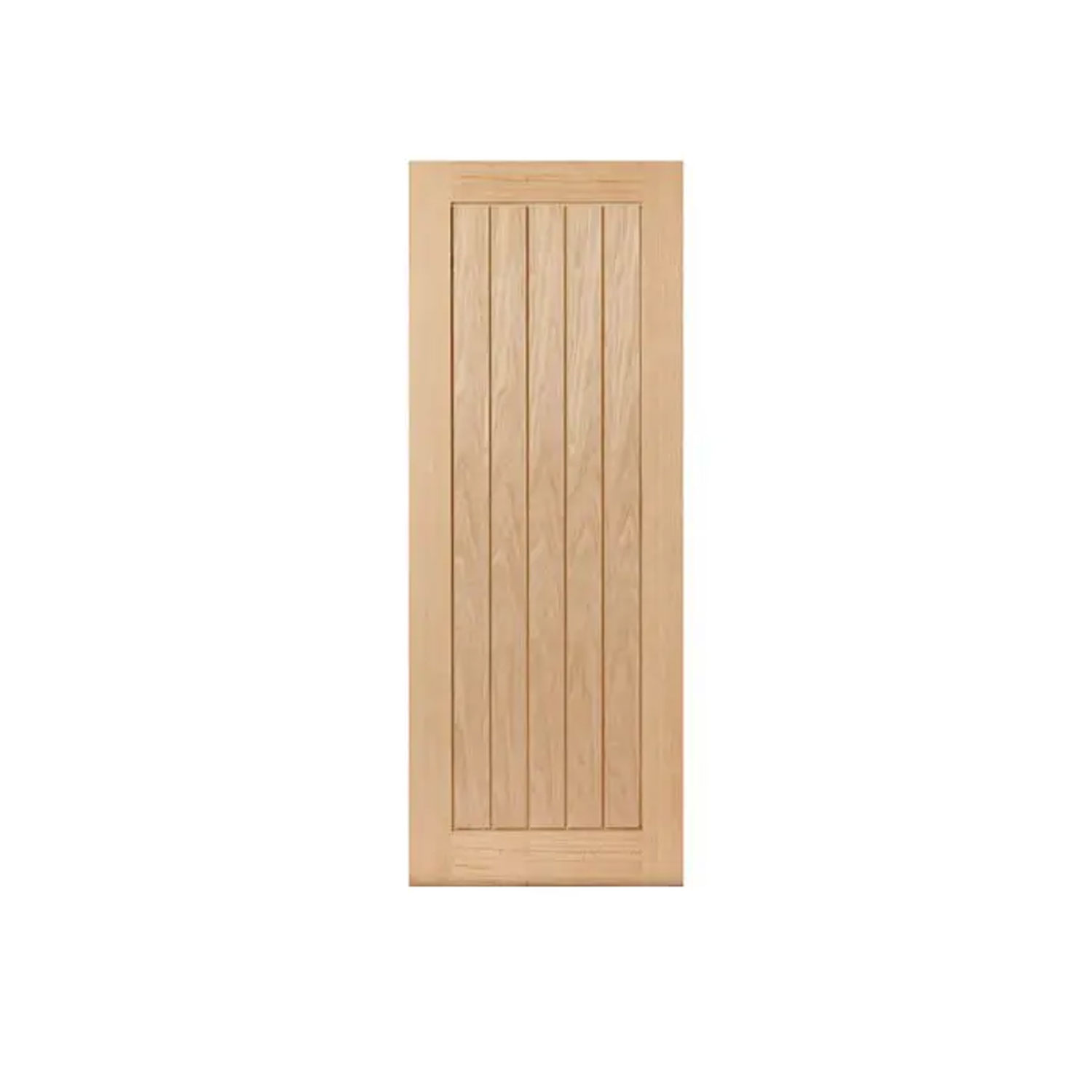
With its subtle yet stylish design, this oak veneer door would easily slide into any interior scheme, from rustic settings to those with a more contemporary twist. It is supplied unfinished, ready for you to paint or varnish and its solid construction offers great soundproofing qualities.
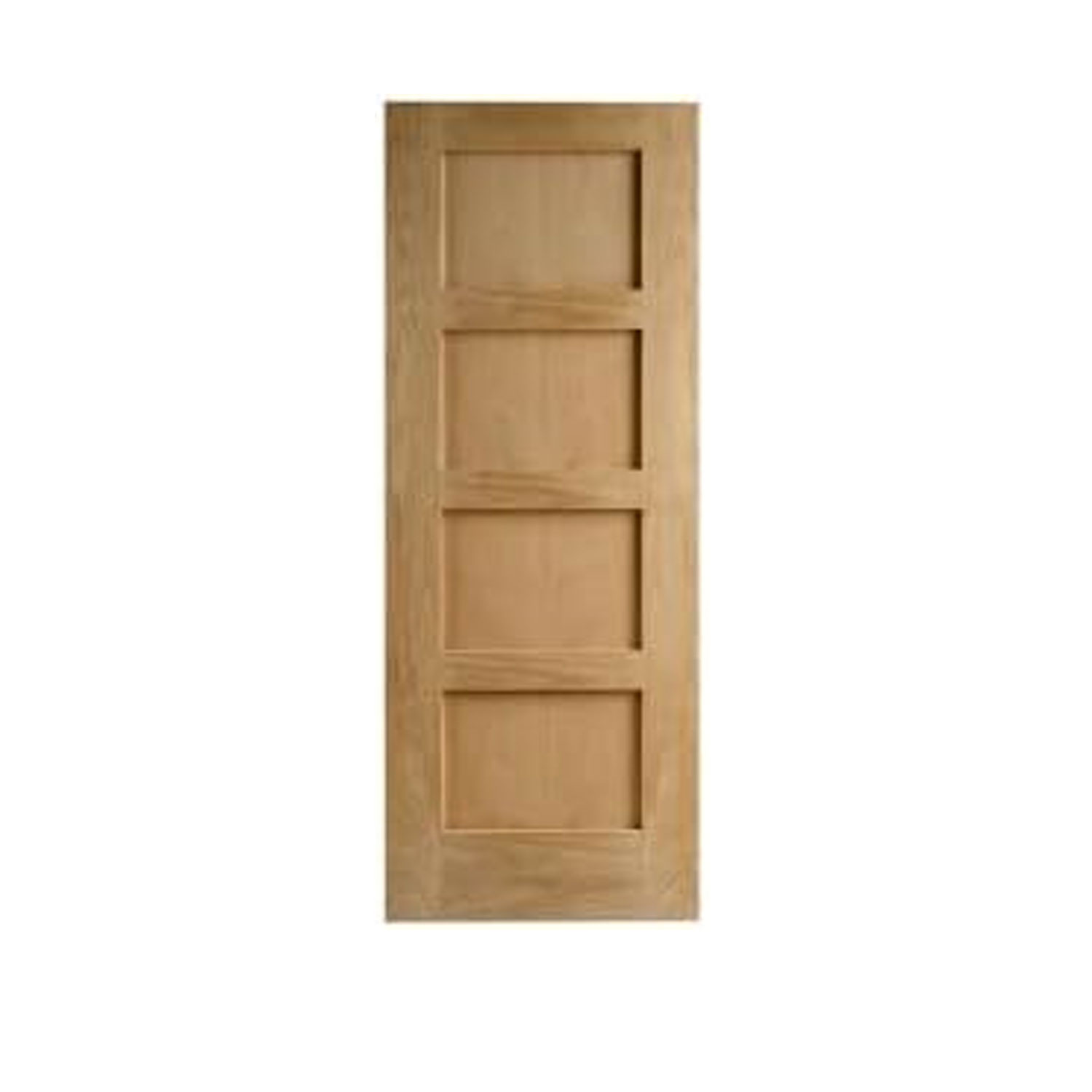
The minimalist design of this beautiful oak door would suit modern and traditional interior schemes just as well. It has impressive acoustic properties. Despite being made from oak, it is engineered to resist warping or twisting. It comes unfinished, ready for you to varnish or paint.
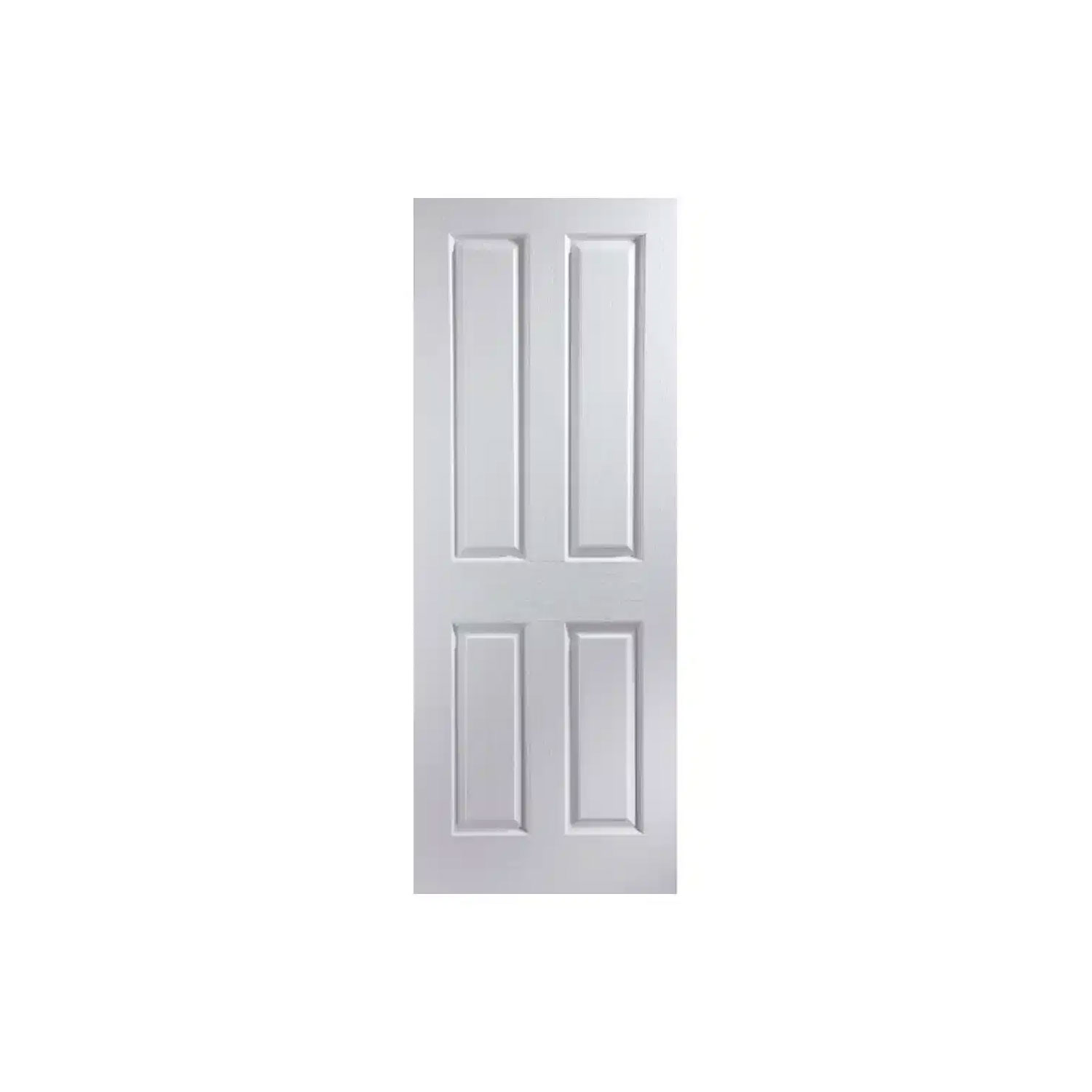
Sturdy and reassuringly durable, this solid core door is a great option for anyone wanting to upgrade their existing bedroom door with a model that will help keep out unwanted noise. It is supplied ready-primed with a white base coat, ready for you to paint in any colour your heart desires.
How can you soundproof a bedroom on a budget?
If you are looking for some quick and easy solutions to reduce the noise getting into your bedroom, try some of the following - the more you can implement, the better:
- Check the seals on your double glazing - they can fail over time
- Apply acoustic caulk around you window frames
- Use sound-dampening curtains
- Fit thicker carpets or add extra thick rugs to your existing floor
- Cover hard surfaces with thick soft blankets and cushions - they will absorb some sound
- Invest in a white noise machine to block out unwanted sounds. The White Noise Machine by Brown Noise from Amazon is a good option.
When looking at how to reduce the amount of noise that you can hear in your bedroom, do remember to look at how to insulate your house in general. This can help with noise transfer as well as making it more comfortable to spend time in.
Get the Homebuilding & Renovating Newsletter
Bring your dream home to life with expert advice, how to guides and design inspiration. Sign up for our newsletter and get two free tickets to a Homebuilding & Renovating Show near you.
Natasha was Homebuilding & Renovating’s Associate Content Editor and was a member of the Homebuilding team for over two decades. In her role on Homebuilding & Renovating she imparted her knowledge on a wide range of renovation topics, from window condensation to renovating bathrooms, to removing walls and adding an extension. She continues to write for Homebuilding on these topics, and more. An experienced journalist and renovation expert, she also writes for a number of other homes titles, including Homes & Gardens and Ideal Homes. Over the years Natasha has renovated and carried out a side extension to a Victorian terrace. She is currently living in the rural Edwardian cottage she renovated and extended on a largely DIY basis, living on site for the duration of the project.

